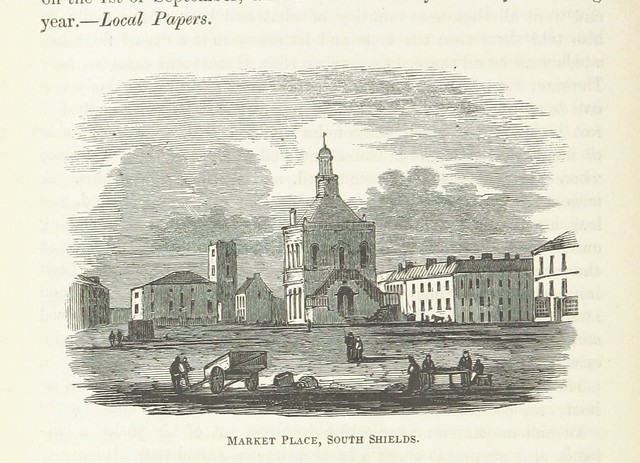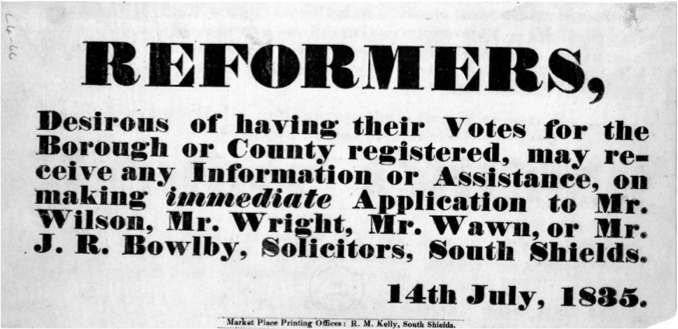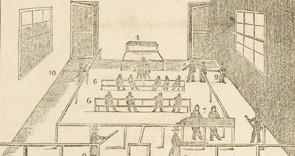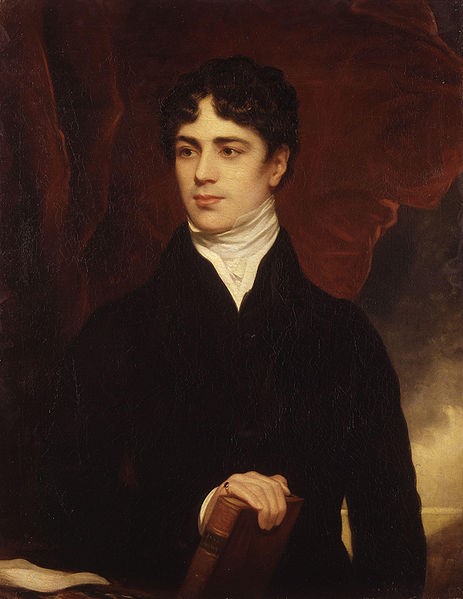
POSTS can now be found under PROJECTS.
| < PART 4 | PART 6 > |
RUSSELL BOWLBY (1792-1865)
THE LIFE AND TIMES OF THE MEMBER OF PARLIAMENT THAT NEVER WAS!
28 JUNE 2020

PART 5: Politics and Principles
GENERAL ELECTION 1835
This was called, twenty-five months after the constituency of South Shields had secured their first M.P., Robert Ingham. Russell Bowlby had withdrawn his candidature on the eve of the election, promising the electorate that he would contest the borough in the subsequent election. In fulfilling his promise, he did not show the same passion he exuded in his previous campaign. The hustings were assembled outside the town Hall in the Market Place on the 7th January 1835 and Richard Shortridge, the Senior Magistrate was again the Returning Officer. There were only two candidates, Robert Ingham representing the Liberal Party and Russell Bowlby the Radicals. Charles Palmer the Conservative candidate in the 1832 election opted not to stand satisfied that Robert Ingham assured the interests of the shipping fraternity. Henry Anderson of the Bents endorsed the candidature of Robert Ingham whilst that of Russell Bowlby was by his brother in law, John Surtees White, a solicitor (later he was a Barrister at Law in Tasmania where he died). His son John Russell Bowlby and John Twizell Wawn campaigned on his behalf.

Robert Ingham addressed the crowd outlining the issues on which he was campaigning. Russell Bowlby started by congratulating Robert Ingham on his parliamentary success, bearing him no grudge or criticism of his tenure as an M.P. In fact, he said that his manifesto, mirrored his own beliefs with only one exception was that of the payment of Church Rates.* Richard Shortridge, moved to the ballot. The show of hands was in favour of Russell Bowlby. To satisfy the demand of the crowd, a ballot was agreed the following morning. The results of the count were as follows:

GENERAL ELECTION 1837
This was called following the accession of Queen Victoria to the throne in July of 1837. The Conservatives again did not contest this election, many of those with investments in the shipping industry continued to be confident in Robert Ingham, as he was of the right wing of the Liberal Party and he represented their interests. There were calls in the press for an opposing candidate to come forward with a hint that someone of Russell Bowlby's demeanour would have been welcomed but none rose to the challenge presumably because any opposition would have been unsuccessful in what was in effect a coalition of Liberals and Conservatives. Robert Ingham was elected unopposed.
However, Russell Bowlby did play an active part in the 1837 election in the adjoining borough of Sunderland, where he also had a law practice. He nominated Andrew White as the Radical candidate, the Mayor of Sunderland, a Methodist with interests in shipping, railways, banking, soap-manufacture, insurance and mining (1). Bowlby had the opportunity to oversee the election of a Radical candidate to Parliament and in so doing, he was provided with a more significant platform to voice his political views. In his address to the electors, he spoke of bribery, saying that if they
'sacrificed their votes from mercenary motives, they would be guilty of a crime of a deeper dye, of species of more degraded immorality, than the starving who that day should pick a pocket in the crowd. (Cheers and laughter.)' He moved on saying that they should not be cowardly in sacrificing their vote 'through dread of a tyrannical landlord, a domineering customer' … or a dictatorial employer'.
Andrew White in his address expressed many of the views of Russell Bowlby, that of the removal of Church Rates*; extending the suffrage to all rate-paying householders; vote by secret ballot; religious tolerance supporting the rights of Dissenters, Protestants, Catholics, and Jews; religious reform in Ireland. He also expressed a need for an alternative form of punishment to the flogging of soldiers and sailors (2). Duly elected, Andrew White only serving in one parliament.
VOTE BY SECRET BALLOT
Casting a vote at the hustings was not confidential with voters easily intimidated by neighbours, family members, business associates etc. The choice of candidate was recorded in poll books. Another issue was that of false representation.
Russell Bowlby witnessed this first hand during the election for two M.P.'s to represent North Durham in August of 1837. He was in the South Shields Committee Room campaigning for the Liberal candidates Hedworth Lambton and Sir William Chaytor when four men arrived from Sunderland 'in a carriage and four' prepared to swear that they were registered; gentlemen who it was thought could not poll because they lived in London. 'One of them, a fellow without a shirt, was ready to maintain his oath that he was a M.P.; another, without a crown to his hat, that he was a Banker; and a third and a fourth, that they were other persons of equal rank and respectability'.
Recognizing the attempted perjury, Russell Bowlby refused to allow them to vote. The Newcastle Journal an openly partisan newspaper favouring the Conservative party commented:
'Mr. Russell Bowlby, who, with all his faults and failings, has much of the feelings of a man of honour and a gentleman' (3).
This was not unique to South Shields but it was in the borough that the first action was taken. Richard Shortridge, the lead magistrate on receipt of a petition signed by almost a hundred voters, convened a meeting in the Town Hall:
'for the purpose of considering on the expediency of petitioning Parliament for the votes at elections for Members of Parliament to be taken by ballot'.
By September 1837, almost one hundred electors had signed a petition for elections to be conducted by secret ballot. Russell Bowlby having proposed Brian Abbs of Cleadon House for the Chair (4) moved the first resolution:
'reprobating in strong and indignant terms the abominable Tory system of bribery and intimidation; and James Mather and John Lowery 'refuted with admirable clearness the flippant and inconclusive arguments urged by the Tories against the ballot' (5)
Because of the sheer volume of people attending, the meeting was transferred to the Market Place. Russell Bowlby, then moved the resolution, of adopting vote by ballot:
'in straightforward manly speech, which he fully shewed its necessity to protect the honest and conscientious elector in the exercise of his franchise'.
Robert Ingham had remained in the Town Hall; when he emerged to speak he
'was received with great disapprobation'
in his attempt to justify reasons for not supporting the petition, ostensibly because it, reflected a Radical interest. Even when the resolution was accepted, he was not prepared to present it to Parliament so instead it was entrusted to Hedworth Lambton, the Liberal M.P. for North Durham (6). Bowlby's quest for the reform of the voting system showed South Shields to be a voice for political reform.

Published as part of The People's Charter of 1838, this diagram shows how the principle of a secret ballot could be put into practice.
CHARTISTS
In 1838, the Chartist movement was emerging as the Radical campaign for change and the demand for a secret ballot was one of the six key points of the People's Charter in the Chartists 1838 petition in which it was stated that 'suffrage, to be exempt from the corruption of the wealthy and the violence of the powerful, must be secret' (7). Chartists met with strong opposition from the ruling classes including in South Shields. On 13th May 1839 a proclamation was issued: 'this is to give notice that all persons' attending a planned meeting 'will render themselves liable to be apprehended and dealt with according to the law' (8). A petition, presented to Parliament was discredited because of hundreds of false names included in the petition. It was not until 1872 with the passing of the Ballot Act that vote by Secret Ballot was achieved (9).
JOHN GEORGE LAMBTON, EARL OF DURHAM (1792-1840)
He was first returned as a Member of Parliament for the Whigs in 1813. After the Peterloo Massacre in Manchester in August 1819 when dozens of peaceful protestors were killed and hundreds injured he adopted a more Radical stance and was known as 'Radical Jack' strongly contesting repressive legislation. There was a formidable campaign to unseat him, led by the Dean of Durham.*
The Earl of Durham was Lord Privy Seal in the government of Charles, Earl Grey, also his father-in-law. He played a significant part in the passing of the Great Reform Bill in 1832 disagreeing with him on the limited extent of the franchise and his commitment to more radical politics. A diplomatic career commenced in 1833 with missions to Austria, Prussia and Russia where he was Ambassador 1835 -1837 and finally, in 1838 he was appointed Governor General and Lord High Commissioner of Canada preparing the way for responsible government and unification (9).

John George Lambton by Thomas Phillips
(Wikipedia)
BOWLBY AND LAMBTON
There was undoubtedly a connection between the two; it was on the steps of the South Shields Town Hall that the Earl endorsed Bowlby's candidature in the inaugural South Shields parliamentary election in 1832. Prior to that, in 1827, they were both honorary members of the South Shields Mechanics Institute.
Speaking in 1835, in the middle of his oversees postings, the Earl said that he attributed his success to the loyalty and commitment of the Durham ‘Reformers' and although he did not refer to any by name, Russell Bowlby was a member of that fraternity from its inception in September 1832. The North Durham Reform Society was founded the 15th October 1836 with a commemorative dinner a year later in Durham City when 'a large assemblage of the most distinguished, zealous, and Influential Reformers' including the newly elected and re-elected Liberal MP's for the region. Lambton was elected patron on the proposal of Russell Bowlby and accompanied at the dinner by Richard Shortridge (11).
THE BOWLBY LETTER
This was an open letter written on the 8th July 1837, by the Earl of Durham to the electors of the northern division of Durham in which he defined his political creed and copied to Russell Bowlby, his election agent.
''I remain, sir, with regard, your most obedient servant,
' Durham.
“Russell Bowlby, Esq. & c.'"
He said that he wanted to support 'the existing institutions of the country, the throne, lords, commons, and the Established Church*' whilst at the same time increasing their efficiency and making them available to all 'who had the ability to comprehend them, and the vigour to protect them.' He continued saying that he wanted 'to bring all classes, especially the middle and lower, within the pale of the true, not the spurious constitution.' Change he said would come about 'by the deliberate and determined voice of the people' and that objections and prejudices to change would be gradually overcome (12).
The letter was referred to as 'the Bowlby letter' in such significant journals as 'The Spectator', was widely distributed across the country and used as the basis of several address made by the Earl including in Dublin where he addressed the issue of Catholic Emancipation. When I first read this letter in 2015 and before I reached the signature, I assumed that Russell Bowlby had written it, as the content appeared to express his political beliefs. This could well have been the case as there is evidence elsewhere that the Earl of Durham, in 1838, acknowledged that either or in part that Charles Buller, his private secretary wrote the 'Report on the Affairs of British North America' (13), a commentary and analysis of his actions in Canada.
THE FRIENDSHIP PREVAILED
In a scathing report in the Newcastle Journal of a speech by Andrew White to his constituents in 1839, the Earl, despised by the paper because of his Radical politics was said to have a 'bosom friend and correspondent, Russell Bowlby, of Cleadon Meadows' (14). He died a year later and at his funeral in Chester-le-Street Russell Bowlby attended with Richard Shortridge. Penshaw Monument is a testament to the popularity of the Earl of Durham, which was built through public subscription. Over thirty thousand people were present for the inauguration including many from South Shields who travelled by train.
'A friend of the late Earl of Durham, who had the reputation of being an advanced politician' (15) is how Russell Bowlby was described in his obituary, written in 1865 and twenty-five years after the death of the Earl.
1841 ELECTION
Russell Bowlby may have considered contesting this and decided not to do so rather late in the campaign. By the outset of the 1840's, he was encountering a number of conflicting interests relating to his businesses and solvency, his property and litigation relating to his anti-church and anti-establishment views* preventing him from concentrating his efforts on fulfilling his ambition to be a M.P. The fact that John Twizell Wawn submitted his candidature very late in the campaign, gives some credence to this. A long time friend and supporter of Russell Bowlby, Wawn was described as of 'the extreme movement principle' rather than as a 'Radical'. He was returned as a Liberal M.P.
Comments
The 1840s saw substantial changes not only to the life of Bowlby but also to the political scene with the ascendancy of working class reformer movements, the amalgamation of the Radicals into the Liberal party and the reforming legislation of the Conservative government of Robert Peel.
Bowlby's aspirations had perhaps changed over time, seeing a future as a reformer in a wider political context with his emergence as a leading light amongst the Northern Radical Reformers thwarted on the death of Lambton in 1840. It is indisputable that Russell Bowlby, a man of vision and integrity was the most significant social and political campaigner in South Tyneside, during the 1820s and 1830s yet to this day this has failed to be recognized.
References
- Andrew White, 1792-1856, Methodist, politician & entrepreneur, S. Ville, DNB; W. Stokes, Durham Biog, ii, 122-5
- + Newcastle Journal - Sat. 29 Jul. 1837 p.2
- + Newcastle Journal - Sat.26 Aug.1837 p.2
- + Bell's New Weekly Messenger - Sun. 3 Sep. 1837 p. 1
- + Morning Advertiser - Tues. 5 Sep.1837 p.3
- The People's Charter, The London Working Men's Association-1838 (The British Library Board, 8138.bb.87)
- The Borough of South Shields; George Hodgson 1903 p.169
- The Ballot Act 1872; Wikipedia
- 'John Lambton, 1st Earl of Durham; British Politician;' (Wikipedia)
- + Durham Chronicle - Fri. 20 Oct.1837 p. 2
- 'Memoranda of the Tablets of the Month; Dublin University Magazine', Aug.1837; Vol. 10; p. 232 (Google Books)
- 'Charles Buller: Barrister, Politician and Reformer' (Wikipedia)
- + Newcastle Journal - Sat. 2 Feb.1839 p. 2
- Durham Directory 1865, p. 40
+British Newspaper Archive